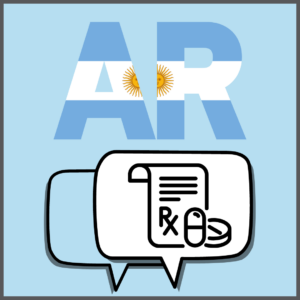
More and more countries are introducing regulations for the serialization of medicinal products, and South America is no exception. With approximately 422 million inhabitants, the continent has a population comparable to that of the European Union and is becoming an attractive market for exporters due to its emerging economies. Following our article on serialization in Brazil, we now summarize the regulations in Argentina.
Title: Resolution 435/2011, Argentina National Drug Traceability System
Responsible Authorities: Ministry of Health (MoH) and the National Administration of Drugs, Food and Medical Technology of Argentina (ANMAT)
Products: Prescription pharmaceutical products
Code Type: GTIN or an equivalent code issued by ANMAT
Aggregation: Not mandatory, but explicitly recommended
Implementation Timeline
With Resolution 435/2011, effective January 1, 2011, Argentina introduced the SNT (Sistema Nacional de Trazabilidad; English: National Traceability System). The regulation mandated that every active pharmaceutical ingredient (API) must be uniquely identified to ensure traceability throughout the supply chain. The law was prompted by Argentina’s significant issues with counterfeit medicines.
Subsequently, Regulation 3683/2011 specified the requirements for pharmaceutical companies. It also mandated a central database for storing product information within the SNT. Initially, only certain APIs were subject to traceability. Over time, the list of traceable substances was regularly updated. Implementation began on December 15, 2011, with a 12-month transition period.
Starting March 1, 2015, Regulation 963/2015 introduced mandatory serialization for specific prescription drugs in four phases, concluding on August 30 of the same year.
Argentina’s Serialization System
Argentina’s pharmaceutical serialization system is a track-and-trace model. It enables the tracking of medicines and APIs from the manufacturer or importer all the way to the patient. At each step of the supply chain, real-time traceability must be confirmed via ANMAT’s central database. Aggregation is not required but is recommended to simplify logistics.
General Requirements
Pharmaceuticals sold commercially must first be reviewed and approved by ANMAT. Approved medicines are listed in the Registro de Especialidades Medicinales (REM). These lists include antibiotics, insulin, coagulation factors, a wide range of cardiovascular drugs, and medications for the central nervous system, such as antidepressants, antipsychotics, epilepsy, and Parkinson’s treatments. These products can only be registered and imported by ANMAT-approved laboratories.
The Four Phases of Regulation 963/2015
In 2015, serialization of various medicines became mandatory in a short timeframe. The regulation also defined the requirements for Argentina’s serialization code. Each phase corresponds to lists of medicines published by ANMAT that must be serialized:
- Phase 1 – March 1, 2015
- Phase 2 – April 30, 2015
- Phase 3 – June 30, 2015
- Phase 4 – August 30, 2015
Argentina’s Serialization Code
The machine-readable codes used for pharmaceutical serialization in Argentina are Global Trade Item Numbers (GTINs). Similar codes are also permitted, provided they are issued by ANMAT. GTINs can contain up to 20 alphanumeric characters and include expiration date, batch number, and serial number. The machine-readable data carrier must comply with GS1 standards. Accepted formats include GS1-128, RFID, and DataMatrix.
New ANMAT Regulation 2025
On September 1, 2025, ANMAT published Regulation 6223/2025, which defines which pharmaceutical ingredients must be traceable in the future. These include substances with a high risk of counterfeiting or significant therapeutic relevance, such as oncology drugs, insulin, and coagulation factors. Medicines for rare diseases and implantable dosage forms are also covered by the new regulation.
At the same time, the authority clearly excludes certain products: radiopharmaceuticals, over-the-counter products, and specific hospital preparations are exempt from traceability. Exceptions apply if there is a heightened risk of illegal trade involving the substance. For example, cannabidiol has been added to the list of APIs requiring serialization.
[Disclaimer]This information is only one possible interpretation of the regulations. They are also in a constant state of change, so the information in this article may be incomplete or out of date. The above article is expressly no legal advice. Please refer to the official documents for information before making any business decisions. (Status of information: October 2025)